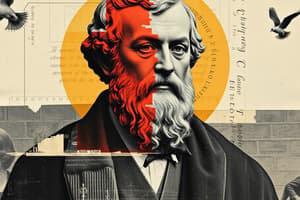Podcast
Questions and Answers
According to Aristotle, virtue is developed through continual practice, which eventually becomes part of our character.
According to Aristotle, virtue is developed through continual practice, which eventually becomes part of our character.
True
Courage is categorized as a vice.
Courage is categorized as a vice.
False
Anhedonia is a term used to describe a state of excessive pleasure-seeking.
Anhedonia is a term used to describe a state of excessive pleasure-seeking.
False
The Character/Virtue Test can be used to evaluate actions based on personal and organizational ideals.
The Character/Virtue Test can be used to evaluate actions based on personal and organizational ideals.
Signup and view all the answers
Padding an expense account can strengthen a person's habit of being compassionate towards others.
Padding an expense account can strengthen a person's habit of being compassionate towards others.
Signup and view all the answers
Remorse is an example of a virtue according to the categorization of virtues and vices.
Remorse is an example of a virtue according to the categorization of virtues and vices.
Signup and view all the answers
The process of habituation involves performing virtuous acts less frequently.
The process of habituation involves performing virtuous acts less frequently.
Signup and view all the answers
According to Jonas, the concept of 'nature' has remained unchanged despite technological advancements.
According to Jonas, the concept of 'nature' has remained unchanged despite technological advancements.
Signup and view all the answers
Jonas emphasizes the importance of human freedom in relation to ethical choices regarding actions influenced by technology.
Jonas emphasizes the importance of human freedom in relation to ethical choices regarding actions influenced by technology.
Signup and view all the answers
Genetic engineering is presented by Jonas as a beneficial advancement for the human species.
Genetic engineering is presented by Jonas as a beneficial advancement for the human species.
Signup and view all the answers
Jonas suggests that current ethical theories are fully equipped to address the challenges posed by technological advancements.
Jonas suggests that current ethical theories are fully equipped to address the challenges posed by technological advancements.
Signup and view all the answers
Jonas proposes that technologies can create a new form of 'nature' influenced by human actions.
Jonas proposes that technologies can create a new form of 'nature' influenced by human actions.
Signup and view all the answers
Machiavelli believed that it is better to be loved than feared by one's subjects.
Machiavelli believed that it is better to be loved than feared by one's subjects.
Signup and view all the answers
The central theme of Machiavelli's philosophy promotes self-promotion through dominating others.
The central theme of Machiavelli's philosophy promotes self-promotion through dominating others.
Signup and view all the answers
Machiavelli believed that a universal moral system is essential for leadership.
Machiavelli believed that a universal moral system is essential for leadership.
Signup and view all the answers
It is essential for a prince to appear cruel and calculating at all times.
It is essential for a prince to appear cruel and calculating at all times.
Signup and view all the answers
In Machiavellian ethics, the pursuit of power is considered unethical.
In Machiavellian ethics, the pursuit of power is considered unethical.
Signup and view all the answers
Machiavelli emphasizes trust in relationships with neighbors and coworkers.
Machiavelli emphasizes trust in relationships with neighbors and coworkers.
Signup and view all the answers
The term 'Machiavellian' refers to moral and altruistic behaviors.
The term 'Machiavellian' refers to moral and altruistic behaviors.
Signup and view all the answers
Machiavelli's primary concern was only the end results of gaining and holding power.
Machiavelli's primary concern was only the end results of gaining and holding power.
Signup and view all the answers
According to Machiavelli, being calculating and cold in the quest for power is seen as a necessity.
According to Machiavelli, being calculating and cold in the quest for power is seen as a necessity.
Signup and view all the answers
Epicurus believed that wealth is one of the necessary desires for happiness.
Epicurus believed that wealth is one of the necessary desires for happiness.
Signup and view all the answers
Temperance encourages the pursuit of all forms of pleasure without any moderation.
Temperance encourages the pursuit of all forms of pleasure without any moderation.
Signup and view all the answers
Epicurus theorized that the first good recognized by humans is pleasure.
Epicurus theorized that the first good recognized by humans is pleasure.
Signup and view all the answers
Prudence is defined as the ability to act recklessly without regard for one’s interests.
Prudence is defined as the ability to act recklessly without regard for one’s interests.
Signup and view all the answers
Epicurus identified three levels of desires, with necessary desires being the highest priority.
Epicurus identified three levels of desires, with necessary desires being the highest priority.
Signup and view all the answers
Epicurus believed that pursuing second and third-level desires leads to true happiness.
Epicurus believed that pursuing second and third-level desires leads to true happiness.
Signup and view all the answers
Epicurus associates morality closely with the experience of pain and suffering.
Epicurus associates morality closely with the experience of pain and suffering.
Signup and view all the answers
The ultimate goal described by Epicurus is to maximize pain in life.
The ultimate goal described by Epicurus is to maximize pain in life.
Signup and view all the answers
Epicurus viewed empty desires such as fame and power as essential for achieving happiness.
Epicurus viewed empty desires such as fame and power as essential for achieving happiness.
Signup and view all the answers
Simple pleasures, according to Epicurus, can lead to the most happiness and least pain.
Simple pleasures, according to Epicurus, can lead to the most happiness and least pain.
Signup and view all the answers
The Collingridge Dilemma states that controlling technology in its early stage is feasible.
The Collingridge Dilemma states that controlling technology in its early stage is feasible.
Signup and view all the answers
Responsible Research and Innovation (RRI) promotes public engagement as one of its thematic elements.
Responsible Research and Innovation (RRI) promotes public engagement as one of its thematic elements.
Signup and view all the answers
According to the information above, ethics in technology should develop reactively rather than proactively.
According to the information above, ethics in technology should develop reactively rather than proactively.
Signup and view all the answers
Ethics pari passu refers to the simultaneous development of understanding and technology.
Ethics pari passu refers to the simultaneous development of understanding and technology.
Signup and view all the answers
The societal stakeholders mentioned in the context of AI do not include the Church.
The societal stakeholders mentioned in the context of AI do not include the Church.
Signup and view all the answers
One of the areas of interest related to AI is the legal profession.
One of the areas of interest related to AI is the legal profession.
Signup and view all the answers
The harm caused by technology in its late stage is described as unavoidable.
The harm caused by technology in its late stage is described as unavoidable.
Signup and view all the answers
Values are considered unimportant in the deliberation process regarding technology.
Values are considered unimportant in the deliberation process regarding technology.
Signup and view all the answers
The expectation is that societal understanding of AI will lag behind its development.
The expectation is that societal understanding of AI will lag behind its development.
Signup and view all the answers
The opportunities and threats associated with AI are relevant only in the business sector.
The opportunities and threats associated with AI are relevant only in the business sector.
Signup and view all the answers
Study Notes
- Virtue ethics is an ethical theory focusing on character rather than action.
- Virtue ethics emphasizes the importance of developing virtuous qualities.
- Aristotle's ethical treatises, including Nicomachean Ethics, Eudemian Ethics, and Magna Moralia, are foundational works of virtue ethics.
- Modern virtue ethics theories, such as those developed by Alasdair MacIntyre, Martha Nussbaum, Philippa Foot, Elizabeth Anscome, and Rosalind Hursthouse, build upon Aristotelian ideas.
- A key concept of virtue ethics is the importance of finding the "golden mean" between two extremes, with excess and deficiency considered vices.
- Virtue is a skill, a way of life that is learned through experience.
- Virtuous actions can lead to happiness or human flourishing.
- Apple, Starbucks, and Jollibee were mentioned as companies with core values.
- A case study was presented about a new employee pressured by colleagues to falsify company expense reports.
- Practical wisdom (phronesis or prudence) involves applying general concepts (like a good life) to specific situations and going beyond mechanical rule application.
- The character or virtue test assesses if an action aligns with the kind of person one wants to be and if it reflects one's organization’s reputation or vision.
- Eudaimonia is translated as a life well-lived or human flourishing.
- Several examples of virtues and vices were presented via tables such as cowardice, courage, foolhardiness, temperance, Lust, gluttony, gratitude, overindebtedness, remorsefulness, and scrupulosity.
- Deontology is a class of ethical theory where people adhere to their obligations and duties.
- Immanuel Kant developed the categorical imperative to determine moral actions from a rational standpoint.
- Moral obligation is independent from particular desires in deontology and not outcome-dependent.
- Three ways to formulate the Categorical Imperative include universality principle, formula of humanity, and autonomy of individual.
- Hypothetical “oughts” are based on desires, while categorical “oughts” are based on reason.
- Utilitarianism is a consequentialist theory focusing on the outcome of actions to determine moral rightness.
- Utilitarianism prioritizes the greatest overall happiness for all stakeholders.
- Utilitarianism argues that happiness and pleasure are good, and we should work to increase them.
- Classical utilitarianism suggests an action is right if it produces the greatest overall balance of happiness over unhappiness, considering all individuals equally.
- Utilitarianism distinguishes between higher and lower pleasures.
- Act utilitarianism emphasizes individual actions that maximize overall happiness, whereas rule utilitarianism emphasizes following rules likely to maximize overall happiness.
- Various case studies were presented on issues regarding ethical theories.
- Issues regarding ethics of the use and development of technology, regulation and considerations for specific examples or issues were also presented within specific areas or examples presented in the slides.
Studying That Suits You
Use AI to generate personalized quizzes and flashcards to suit your learning preferences.
Related Documents
Description
Explore the concepts of virtue and ethics as discussed by Aristotle and Jonas. This quiz examines the development of character through habituation, the categorization of vices and virtues, and the ethical implications of technological advancements. Test your understanding of these philosophical insights and their relevance in contemporary society.




